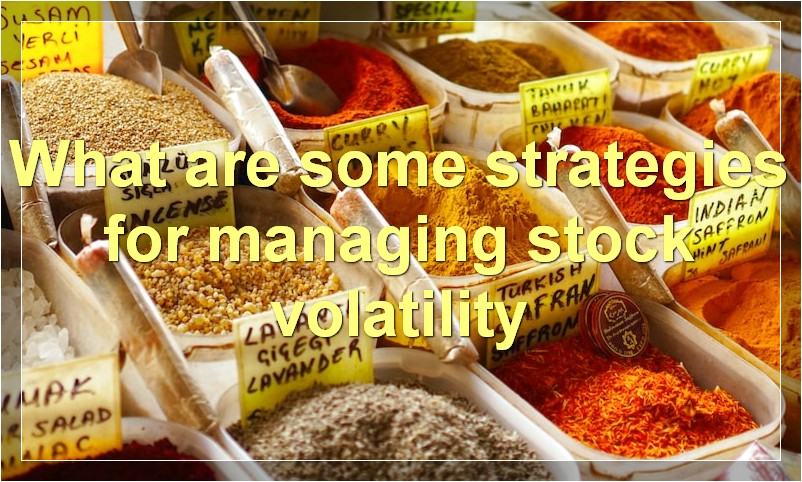If you’re thinking about investing in stocks, it’s important to understand volatility. In this article, we’ll explore what stock volatility is, how it impacts investors, and how to manage it.
What factors affect stock volatility
There are many factors that can affect the volatility of a stock. Some of these factors include the overall market conditions, the company’s financial stability, and current news events.
Investors often watch volatile stocks carefully, as they can be quick to rise or fall in value. For some investors, volatile stocks may offer more opportunity for profit, while others may prefer to avoid them.
Overall market conditions are one of the most important factors affecting stock volatility. When the market is strong, stocks tend to be more stable. However, when the market is weak or uncertain, stocks may become more volatile.
The financial stability of a company is also a key factor affecting stock volatility. If a company is doing well financially, its stock is likely to be more stable. However, if a company is struggling financially, its stock may become more volatile.
Finally, current news events can also affect stock volatility. If there is positive news about a company, its stock may rise. However, if there is negative news about a company, its stock may fall.
How do you calculate stock volatility

Volatility is a measure of how much the price of a security, such as a stock, fluctuates. There are a number of ways to calculate it, but the most common is to take the standard deviation of the security’s return over a period of time.
The higher the volatility, the greater the risk of investing in the security. That’s because high volatility means that there is a greater chance that the price will move sharply in either direction – up or down.
Investors use volatility to help them assess how risky an investment is. If you’re thinking about buying a stock, for example, you might want to look at its volatility over the past year to get an idea of how risky it is.
Volatility can be a good thing or a bad thing, depending on your perspective. For example, some investors see high volatility as an opportunity to make quick profits. Others view it as a sign of risk and stay away from volatile stocks.
Whatever your opinion, it’s important to understand how to calculate volatility and what it means before making any investment decisions.
Why is stock volatility important
Volatility is a measure of the amount by which an asset’s price changes over time. It is considered to be an important metric when determining the riskiness of an investment.
The higher an asset’s volatility, the greater the price swings it experiences and the more risky it is considered to be. For investors, this means that there is a greater chance of losses when investing in a volatile asset.
However, it is important to note that stock volatility can also present opportunities for profit. When prices are volatile, they tend to move in cycles. By correctly predicting these cycles, investors can make profits even in a volatile market.
Thus, while stock volatility is certainly a risk factor to consider, it is not necessarily a negative indicator. Instead, it should be viewed as one of many factors to take into account when making investment decisions.
What is the difference between historical and implied volatility
Volatility is a measure of how much the price of an asset varies over time. Historical volatility is a measure of how much the price of an asset has varied over a specific period of time in the past. Implied volatility is a measure of how much the market thinks the price of an asset will vary in the future.
How do you use stock volatility to make investment decisions
investors can use stock volatility to make informed investment decisions. By understanding how stock prices fluctuate, investors can better assess the risk of an investment and make decisions that maximize returns while minimizing risk.
Volatility is a measure of how much a stock price fluctuates over time. It is calculated by taking the standard deviation of the stock’s return over a period of time. The higher the volatility, the greater the fluctuations in the stock price.
Investors use volatility to gauge the risk of an investment. High volatility stocks are considered to be more risky than low volatility stocks. However, high volatility stocks also have the potential for higher returns. Therefore, it is important for investors to carefully consider the risks and rewards of investing in high volatility stocks before making any decisions.
In general, investors should avoid buying stocks when they are experiencing high levels of volatility. This is because there is a greater chance that the stock price will fall during periods of high volatility. Instead, investors should wait for periods of low volatility before buying stocks. By doing so, investors can minimize the risk of losses and maximize returns.
What are some strategies for managing stock volatility

Volatility is a normal part of the stock market, but there are strategies investors can use to manage it. One common strategy is to diversify your portfolio across different asset classes. This means investing in stocks, bonds, and other investments like real estate or gold.
Another strategy is to create a buffer in your portfolio for volatile periods. This can be done by investing in cash or short-term bonds. When the stock market is down, these investments will help protect your portfolio from losses.
Finally, you can use stop-loss orders to limit your downside risk. A stop-loss order is an order to sell a security when it reaches a certain price. This can help you sell before your losses get too large.
Volatility can be scary, but with these strategies you can protect your portfolio and even profit from it.
What are the risks of investing in volatile stocks
Volatile stocks are those that can experience large swings in price over a short period of time. They can be more risky than other types of stocks, but they can also offer the potential for greater rewards.
There are a few risks to consider before investing in volatile stocks. First, you could lose money if the stock price falls sharply. Second, volatile stocks can be more difficult to sell when you need to raise cash. Finally, some companies whose stock is highly volatile may be in financial trouble and at risk of bankruptcy.
Despite these risks, volatile stocks can be a good investment for experienced investors who are willing to take on a little more risk in pursuit of higher returns. If you’re thinking about investing in volatile stocks, be sure to do your homework and understand the risks involved before making any decisions.
What are the benefits of investing in volatile stocks
Volatility can be a good thing when it comes to stocks. While the stock market has its ups and downs, investing in volatile stocks can help you make money in the long run.
Here are some of the benefits of investing in volatile stocks:
1. You can make a lot of money if you pick the right stocks.
2. Volatile stocks tend to be more interesting and exciting than stable stocks.
3. You can learn a lot about the stock market by investing in volatile stocks.
4. Volatile stocks can give you a chance to make quick profits.
5. You can diversify your portfolio by investing in volatile stocks.
Are there ways to hedge against stock volatility
When it comes to investing in stocks, there is always some level of risk involved. However, there are ways to hedge against stock volatility and minimize your losses.
One way to do this is by investing in low-risk stocks. These are typically stocks that have a history of stability and consistent dividend payouts. Another way to hedge against stock volatility is by diversifying your portfolio. This means investing in a variety of different stocks, so that if one stock takes a hit, your overall portfolio won’t be as affected.
Finally, you can also use stop-loss orders when buying stocks. This means setting a limit on how much you’re willing to lose on a particular stock before selling it. By doing this, you can limit your losses if the stock price does drop unexpectedly.
Overall, there are several ways to hedge against stock volatility. By taking some simple precautions, you can help protect your investment portfolio from big losses.
How does stock volatility impact the overall market
Volatility in the stock market is often viewed as a bad thing by investors. However, there are two sides to every coin. While stock volatility can certainly lead to losses in the short-term, it can also create opportunities for investors to make money in the long-term.
When it comes to the overall market, volatility can actually be a good thing. That’s because when stocks go up and down rapidly, it creates more trading activity. This, in turn, can lead to more liquidity in the market and higher prices for shares.
Of course, too much volatility can be a bad thing. If the market is moving up and down too erratically, it can be difficult for investors to make sound decisions. This can lead to even more selling pressure and further declines in stock prices.
In the end, stock volatility is just one factor that impacts the overall market. While it can certainly create some challenges, it can also lead to more opportunities for investors who are willing to take on a little risk.

